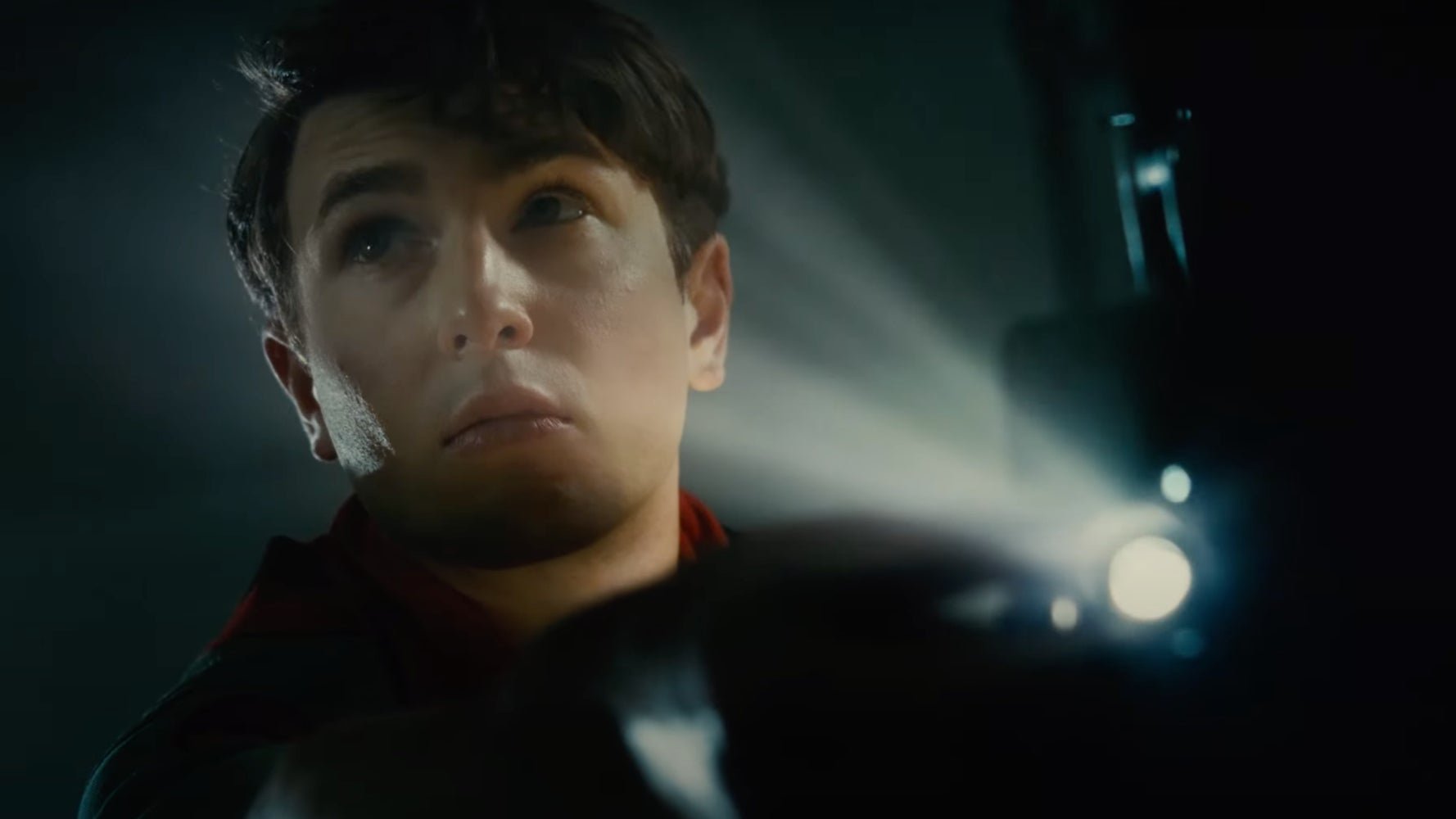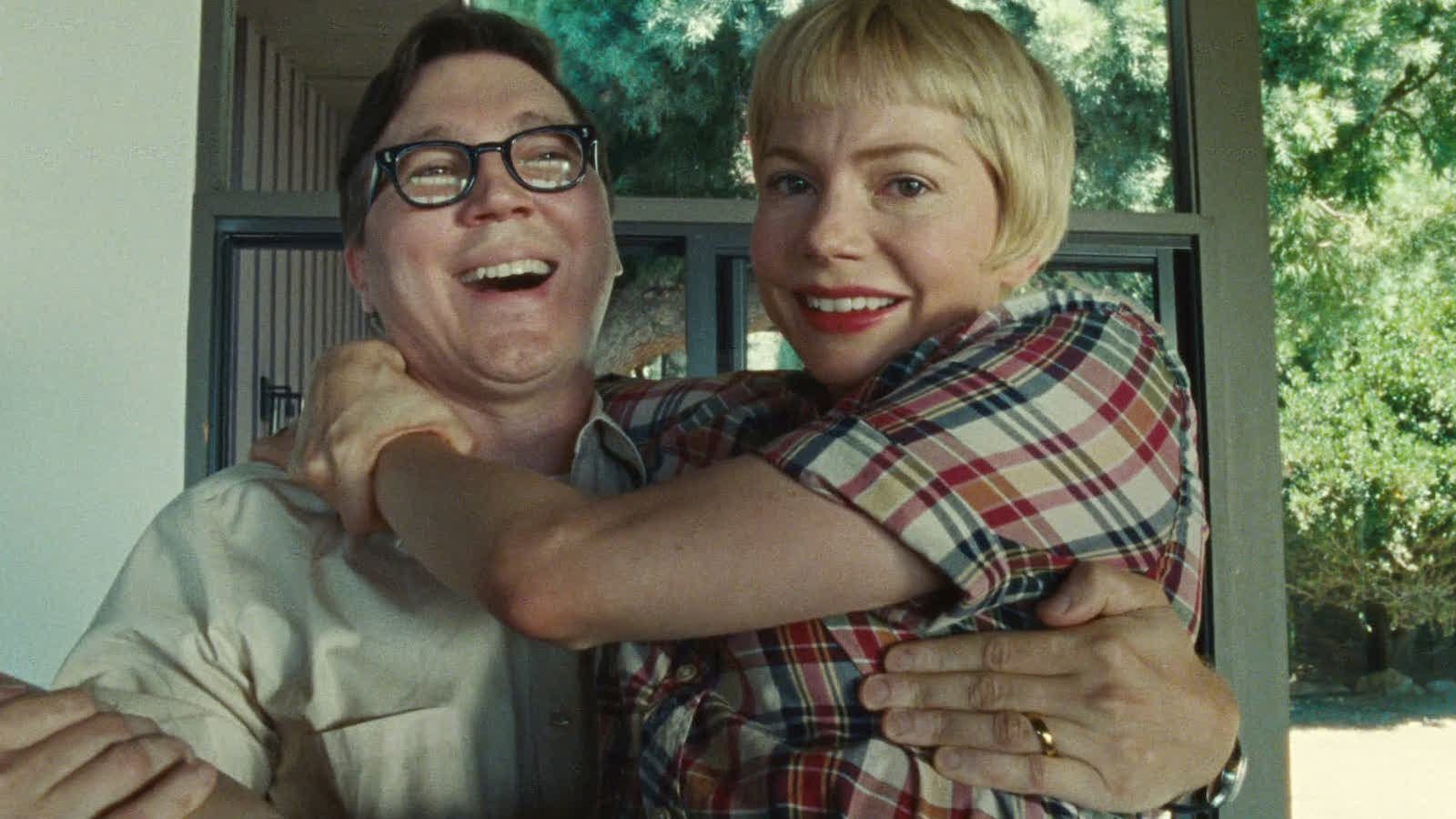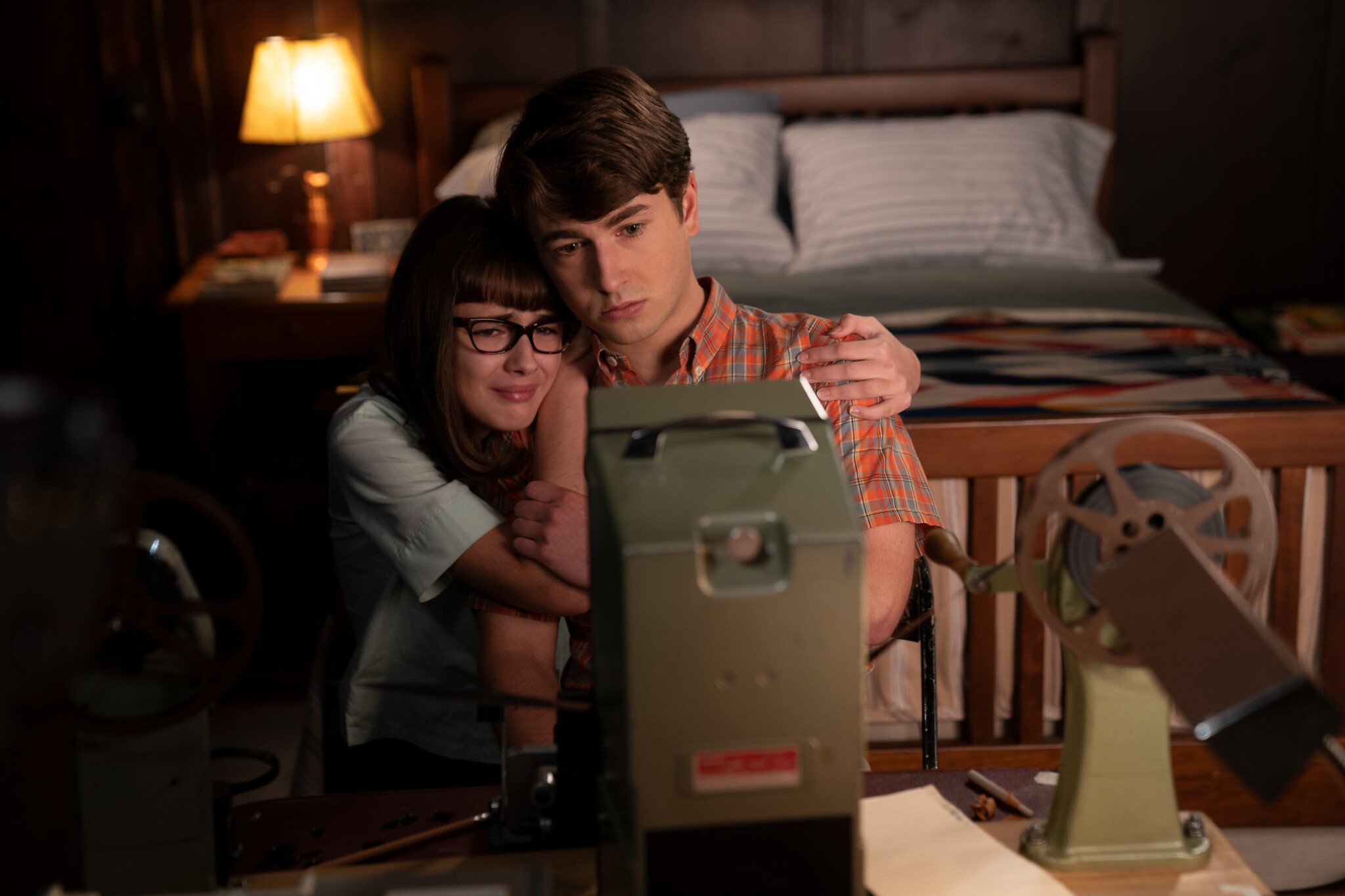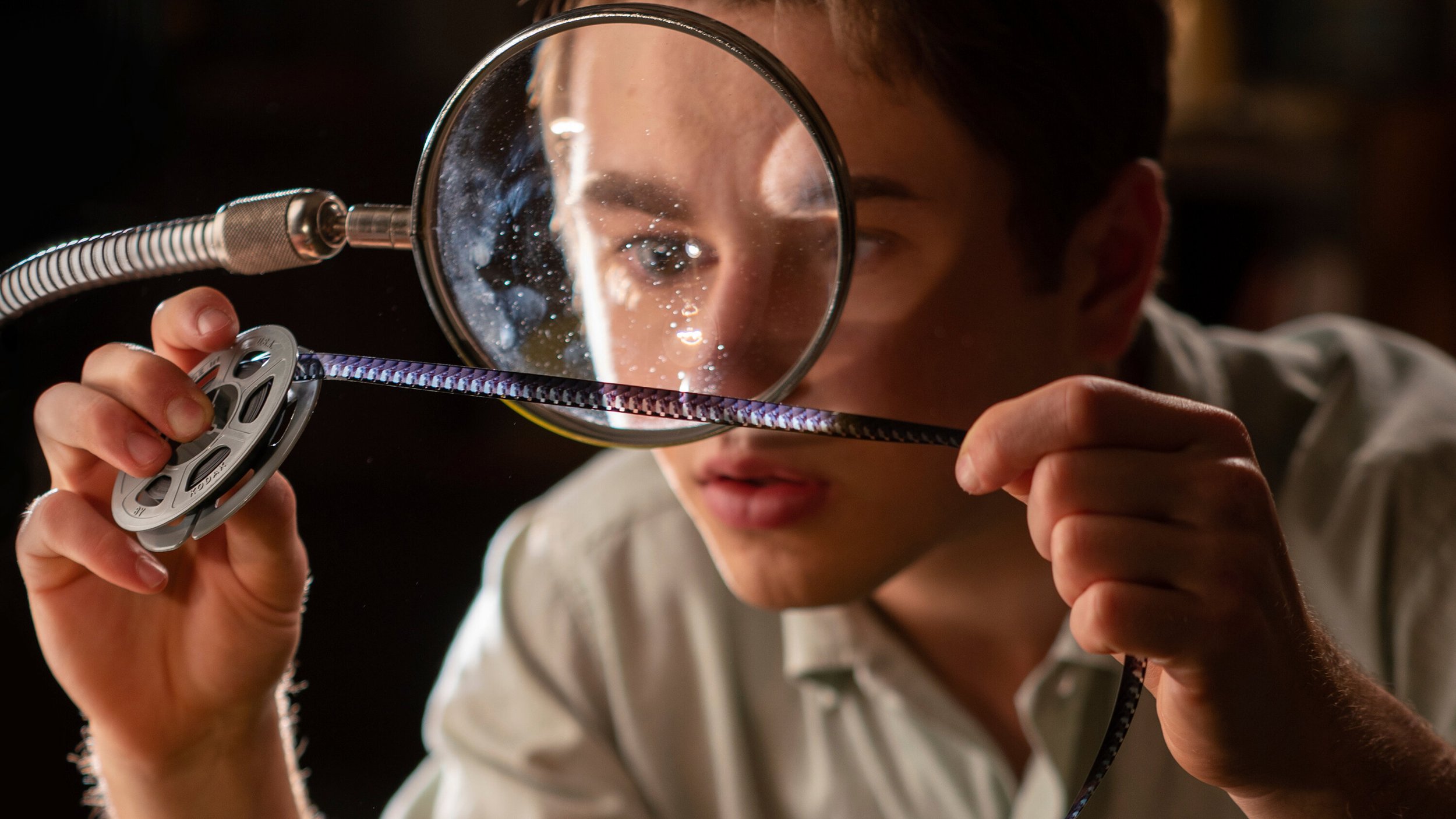“The Fabelmans” Review
Gabriel LaBelle plays a young filmmaker who uses his gift to make his life more extraordinary in “The Fabelmans,” a cinematic version of director Steven Spielberg’s journey as a filmmaker.
Well, this is it. I might as well stop writing about films for the remainder of the year. I’m not going to stop but I have found the best film of the year. While I was certainly anticipating “The Fabelmans,” nothing could have prepared me for the amazing story crafted by cinema legend Steven Spielberg. Not only is “The Fablemans” the best film of 2022, it’s one of Spielberg’s finest works and that’s saying a tremendous lot given his extensive resumé.
Based on Spielberg’s childhood, Sammy Fabelman (Gabriel LaBelle and Mateo Zoryon Francis-DeFord) is an imaginative kid who turns to making movies as a form of expression. This “hobby” eventually gives way to obsession as Sammy’s world becomes more unbalanced by the potential fracturing of his family.
Say you have a masked man put a gun to your head and tell you that he’s going to splatter your brains on the pavement if you don’t answer a question. You ask “what’s the question” and he says, “name any film director.” I’m willing to bet everything I own, my career and my life that the most common answer would be Steven Spielberg. As much as I love and recommend foreign, classic, indie and arthouse films, I know that not everyone wants to see the work of Akira Kurosawa, Werner Herzog or John Waters (even though you should). But that’s what makes Spielberg remarkable. He’s universal.
I’d say that I’ve wanted Spielberg to tell this story for a long time but he already has. If you know anything about him as a filmmaker, you’d know that the divorce of his parents Leah and Arnold had a tremendous impact on not just him, but his work. In films like “Indiana Jones and the Last Crusade,” where the iconic archeologist has a troubled relationship with his father, and “E.T.: The Extraterrestrial,” where Elliot has experienced his parents’ divorce, Spielberg’s personal life has seeped into his work.
The main difference with “The Fabelmans” is that Spielberg isn’t just being allegorical, he’s being autobiographical. While Spielberg is a talented director, he’s not as well known as a writer. In fact, before “The Fabelman’s,” Spielberg has only written or co-written three films: “Close Encounters of the Third Kind,” “Poltergeist” and “A.I.: Artificial Intelligence.” With “The Fabelmans,” which he co-wrote with regular collaborator Tony Kushner, it makes me wonder why he hasn’t written more. This story is so well-crafted and beautiful with just the right balance of drama and humor.
Steven Spielberg (Right) instructs Gabriel LaBelle on how to play an accurate version of himself as a teenage in a scenario that looks as magical as it does odd.
None of the most imaginative minds of Hollywood can come up with anything as crazy as real life and Spielberg understands this. I have read biographies about Spielberg, watched him in interviews and seen the HBO documentary about him so I know his story pretty well. While there is an element of fiction to the film, so much of what’s depicted on screen did happen. When it comes to depicting his life, Spielberg and Kushner do not hold back and I’m grateful for it. Along with gripping drama is a blend of comedy that had the audience roaring with laughter.
Bringing Spielberg’s vision to life is the remarkable cast who perfectly embody the director and his family in an experience that was surely as cathartic as it was moving. Gabriel LaBelle is amazing as a teenage Sammy and truly captures the energy of Steven Spielberg and his love for cinema. One scene, where Sammy is making a war film with his friends, sees Sammy coaching someone who’s never had to act before. With an understanding of story and effective communication, this scene reminded me of old behind-the-scenes footage when Spielberg is coaching the young actors of “E.T.” Mateo Zoryon Francis-DeFord is also remarkable playing Sammy as a little kid. When this child goes to see his first film, seeing that spark be ignited was adorable.
Paul Dano and Michelle Williams capture an undying love as Sammy’s parents while also having a grounded quality to them.
Just as engaging are Sammy’s parents Burt and Mitzi with Paul Dano and Michelle Williams giving possibly the best performances of their careers. While loving towards Sammy, they both have different attitudes towards his filmmaking with Mitzi wanting her son to pursue it while Burt believes it to be just a hobby. You care so much about both of them and, as you begin to suspect that something is wrong in the relationship, your heart breaks for these wonderful people.
I think the best thing you can say about supporting characters is “I wish they were in the film more.” So many of the people in Sammy’s life certainly fulfill that notion with Judd Hirsch and Seth Rogen in particular being integral to Sammy’s calling as a filmmaker. As Bennie, Burt’s best friend who may harbor deep feelings for Mitzi, he is such a lively presence who deeply encourages Sammy. I wish I could watch every film with the same face of unbridled joy that Bennie has when watching Sammy’s films. Hirsch’s performance as Sammy’s uncle Boris is especially powerful as he lets Sammy know the cost of making art in a scene that may get him an award nomination.
Also worthy of praise is Julia Butters who I want to continue to champion because I think she’s a such talented young actor. This is the kid who went toe to toe with Leonardo DiCaprio in “Once Upon A Time In Hollywood” and won. As Reggie, the eldest of Sammy’s sisters, Butters isn’t afraid to tell her big brother what she thinks and she adds so much weight to the family dynamic. There’s a great scene where she and Sammy share a quiet moment looking at a film Sammy’s shot because nothing else makes sense to them. Both Julia Butters and Gabriel LaBelle certainly have a great future after their masterful performances in that scene alone.
Julia Butters (Right) has some of the most poignant scenes in the film including a moment where she and her brother shield out the world by watching Sammy’s progress on a film.
There’s such a depth to the characters, even ones that seem one-note, like people who bully Sammy because he’s Jewish, are given more investment than they deserve. The family depicted in the film is so moving and I didn’t feel like I was watching a fictional film after the first ten minutes.
“The Fablemans” doesn’t succumb to the tired clichés of big budget biopics. There’s no moment where a producer throws a crumpled paperback to Spielberg and says “we need someone to helm this shark picture.” The film feels like Spielberg at last coming to terms with his childhood, his trauma and how it all made him the incredible filmmaker he is. It’s subtle, nostalgic, realistic and all of it results in a brilliant portrait of one of the greatest film directors to ever live. Imagine being so interesting that the film you’re making about your life shows none of your greatest achievements as a filmmaker.
Along for the ride are Spielberg’s usual band of collaborators including composer John Williams who delivers one of his best film scores which, along with the score for the upcoming fifth “Indiana Jones” film, also might be one of his last. Co-Editor Michael Kahn and cinematographer Janusz Kamiński help Spielberg make one of his most well-paced and beautiful films. Shot on gorgeous 35mm, 16mm and 8mm Kodak film, I haven’t been so moved by a film’s imagery since Jordan Peele made me terrified of aliens again in “Nope.”
There’s such care taken with the visual style of “The Fabelmans” and that’s clear from a great shot where Sammy is screening a home movie he’s made. Instead of focusing on the reactions of all of his family, the camera drifts from Sammy’s sisters to his parents and Bennie with Sammy knowingly staring at all three of them. Spielberg and Kushner don't bog down the film with dialogue explaining how we should feel. They show it, often with the movies of Sammy.
As a filmmaker, of course this film was going to hit me harder than the average audience member. There are many scenes where Sammy is looking at family events or activities like moving into a new house, playing dress-up, going camping and thinking to himself “how do I film this.” I instantly related to that because my cousin is just a couple of months away from having her first child and I’m wanting to instruct my mother how to properly film visiting her and my new cousin so that I have some great home footage. No shooting vertically, use the rule of thirds, get adventurous with the angles, ignore the doctors when they tell you that visiting hours are over, etc. I look at everything from that same internal filmmaking lens that Sammy has.
The film’s treatment of filmmaking rivals or even surpasses other stories about motion pictures including “Ed Wood,” “Dolemite Is My Name” and “The Disaster Artist.”
There’s so much care for the filmmaking process in the film and it all is integral to the story as films are how Sammy expresses himself. You get to see Sammy raising money to buy film stock, processing the footage, editing his films, screening them using a record player as a soundtrack and doing whatever he can to make his films feel as real as possible.
While there’s a lot for filmmakers and cinephiles to appreciate, “The Fabelmans” is a film for everyone. It’s a modern masterpiece from Steven Spielberg that mixes drama and comedy perfectly like his previous work as well as the great dramedies like “The Big Chill,” “Steel Magnolias” or “Lady Bird.” When “The Fabelmans” is released to a wider audience very soon, it is my hope that the film makes a good amount of money, especially since Spielberg’s previous film “West Side Story” bombed at the box office. “The Fabelmans” doesn’t deserve that neglect.
What Spielberg deserves is all of our praise for continuing to make great films despite how stupid we are for not leaving our homes to go to the cinema. I was crying throughout so much of this film whether it was from pure joy or sadness. It was an experience I won't be forgetting. After the film ended and I watched all of the credits, like I always do, I hesitated to get up from my seat because that would mean the film was officially done. But when I did leave the theater, I had one question burning in my mind. When can I see it again?






